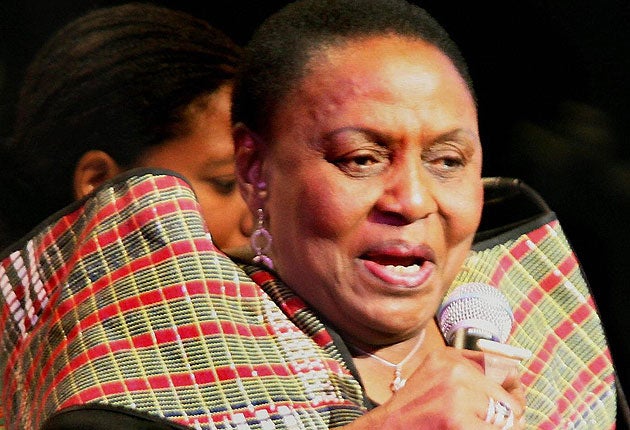South African singer Miriam Makeba dies

Your support helps us to tell the story
From reproductive rights to climate change to Big Tech, The Independent is on the ground when the story is developing. Whether it's investigating the financials of Elon Musk's pro-Trump PAC or producing our latest documentary, 'The A Word', which shines a light on the American women fighting for reproductive rights, we know how important it is to parse out the facts from the messaging.
At such a critical moment in US history, we need reporters on the ground. Your donation allows us to keep sending journalists to speak to both sides of the story.
The Independent is trusted by Americans across the entire political spectrum. And unlike many other quality news outlets, we choose not to lock Americans out of our reporting and analysis with paywalls. We believe quality journalism should be available to everyone, paid for by those who can afford it.
Your support makes all the difference.Miriam Makeba, the South African singer who wooed the world with her sultry voice but was banned from her own country for 30 years under apartheid, died early today after a concert in Italy. She was 76.
The Pineta Grande Clinic, a private clinic near the southern city of Naples, said the singer died after being brought there. The ANSA news agency reported that Makeba apparently suffered a heart attack after performing for 30 minutes at a concert against organized crime.
The death of "Mama Afrika," as she was known, plunged South Africa into shock and mourning.
"One of the greatest songstresses of our time has ceased to sing," Foreign Affairs minister Nkosazana Dlamini Zuma said in a statement.
"Throughout her life, Mama Makeba communicated a positive message to the world about the struggle of the people of South Africa and the certainty of victory over the dark forces of apartheid and colonialism through the art of song."
Makeba wrote in her 1987 memoirs that friends and relatives who first encouraged her to perform compared her voice to that of a nightingale. With her distinctive style combining jazz with folk with South African township rhythms, she was often called "The Empress of African Song."
She first started singing in Sophiatown, a cosmopolitan neighborhood of Johannesburg that was a cultural hotspot in the 1950s before its black residents were forcibly removed by the apartheid government.
She then teamed up with South African jazz trumpeter Hugh Masekela — later her first husband — and her rise to international prominence started when she starred in the anti-apartheid documentary "Come Back, Africa" in 1959.
When she tried to fly home for her mother's funeral the following year, she discovered her passport had been revoked. It was 30 years before she was allowed to return.
In 1963, Makeba appeared before the U.N. Special Committee on Apartheid to call for an international boycott of South Africa. The South African government responded by banning her records, including hits like "Pata Pata," "The Click Song" ("Qongqothwane" in Xhosa), and "Malaika."
Enjoy unlimited access to 100 million ad-free songs and podcasts with Amazon Music
Sign up now for a 4 month free trial (3 months for non-Prime members)
Enjoy unlimited access to 100 million ad-free songs and podcasts with Amazon Music
Sign up now for a 4 month free trial (3 months for non-Prime members)
Makeba received the Grammy Award for Best Folk Recording in 1966 together with Harry Belafonte for "An Evening With Belafonte/Makeba." The album dealt with the political plight of black South Africans under apartheid.
Thanks to her close relationship with Belafonte, she received star status in the United States and performed for President John F. Kennedy at his birthday party in 1962. But she fell briefly out of favor when she married black power activist Stokely Carmichael and moved to Guinea in the late 1960s.
After three decades abroad, Makeba was invited back to South Africa by anti-apartheid icon Nelson Mandela shortly after his release from prison in 1990 as white racist rule crumbled.
"It was like a revival," she said about going home. "My music having been banned for so long, that people still felt the same way about me was too much for me. I just went home and I cried."
She insisted that her songs were not deliberately political.
"I'm not a political singer," she insisted in an interview with Britain's Guardian newspaper earlier this year. "I don't know what the word means. People think I consciously decided to tell the world what was happening in South Africa. No! I was singing about my life, and in South Africa we always sang about what was happening to us — especially the things that hurt us."
Makeba announced her retirement three years ago, but despite a series of farewell concerts she never stopped performing. When she turned 75 last year, she said she would sing for as long as possible.
Graham Gilfillan, Makeba's longtime business manager, said the family was holding a meeting in South Africa and would release a statement.
Arts and Culture Ministry spokesman Sandile Memela described Makeba as an international icon.
"It's a monumental loss not only to South African society in general but for humanity," he said.
Tributes poured in on morning radio talk shows, with many callers in tears as they recalled her humor and her unrelenting spirit.
"She had been part of my life for a long time. It is a great loss," singer P.J. Powers told local radio station 702. "She had a huge soul."
Join our commenting forum
Join thought-provoking conversations, follow other Independent readers and see their replies
Comments